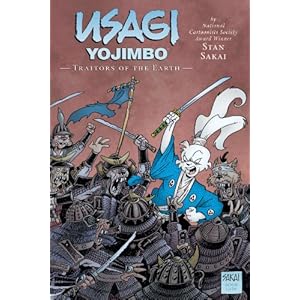
Although I enjoy each new Usagi Yojimbo volume just for the stories, I was particularly attracted to this latest collection due to the introduction. It's by comic grand master Walter Simonson.
As I would expect from such an insightful contributor, Simonson sums up beautifully the appeal of Sakai's series:
I have read this comic book, since its beginning, for all the right reasons. Regularly, like clockwork, it brings me the unalloyed joy of reading a well-told, well-drawn story, about characters I have come to care about. For me, that's the highest praise I can give any comic book.
That's why Usagi Yojimbo has continued for so long with such well-deserved recognition, and also why it's so hard to talk about. How do you find new ways to recommend a series whose greatest strength is its consistency in excellence? 'It's still good' doesn't draw attention or raise sales ' which is why so many other, shorter-running series resort to stunts or creative changes, and they still don't satisfy as much as Usagi does. Perhaps I should follow Walt's lead and talk more about how classic and accomplished Sakai's storytelling is 'fashioned with craft, care, devotion'. (Only I don't have nearly the reputation to stand behind it.)
Traitors of the Earth collects Usagi Yojimbo #117'#123 with stories from Dark Horse Maverick 2001 and MySpace Dark Horse Presents #35. The book opens with a flashback to young Usagi in training, where a demon story teaches an unexpected lesson. The following tale shows a grown-up Usagi continuing the tradition, educating another youngster. Those are just introductions to the much longer story, involving a stolen mystical trinket. It turns out to have the power to create an undead army in a beautifully illustrated tale. There's magic, death, battle, and someone called Sasuke the Demon Hunter to help rescue Usagi's possessed friend.
The friend is a thief, and the next chapter involves caring for her after her experience. Since this is an adventure comic, though, there's also a mystery about who's trying to kill a local merchant. Usagi additionally gets taken to a bandit gang's secret hideout and brings trouble on a poor family for their hospitality. The book ends with a reprint of issue #123, 'The Death of Lord Hikiji', which was nominated for a 2010 Eisner Award for Best Single Issue. It's about the futility of never-ending quests for vengeance.
There are also a few cultural story notes, a one-page 'Usagi vs. Groo' crossover, and a gallery of cover art. (The publisher provided a digital review copy.)
0 comments:
Post a Comment